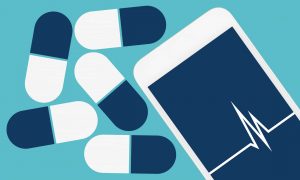From apps to artificial wombs: the smart tech transforming NHS care
Apps have also arrived on the market to boost mental health. The Ginger.io app pairs subscribers to personal coaches who will draw up a consultation plan and provide daily emotional support. Other apps help people deal with panic attacks, the feelings that lead to self-harm, and with stress and anxiety. There is even an app, Brush DJ, that plays music for two minutes to ensure people clean their teeth for the right amount of time.
Work is under way on other gadget-filled pills that monitor vital signs such as heart and breathing rates as they pass through the body. Similar technology is miniaturising cameras so they can be swallowed and tracked through the digestive tract to look for disease and other abnormalities.
The abrupt transition of early birth could be bridged using an artificial womb. The potential of the technology was demonstrated in a pre-clinical study last year in which lambs born at the equivalent of 23 weeks were successfully incubated in a “biobag†for four weeks.
The NHS already offers stem cell therapies for certain conditions, such as torn tendons, and for disorders such as leukaemia and lymphoma through bone marrow transplants. But work is ongoing to see whether stem cells can regenerate cartilage, restore sight to blind people, and even treat neurodegenerative conditions such as Parkinson’s disease.
For one ambitious project, doctors at University College London, Great Ormond Street hospital and the Royal Free hospital have grown replacement food pipes for babies who are born with part of the organ missing. The tissue is made from stem cells taken from amniotic fluid and grown on a “scaffold†that moulds the cells to the right shape. When transplanted, the lab-grown tissue should allow affected babies to swallow naturally as they grow.
